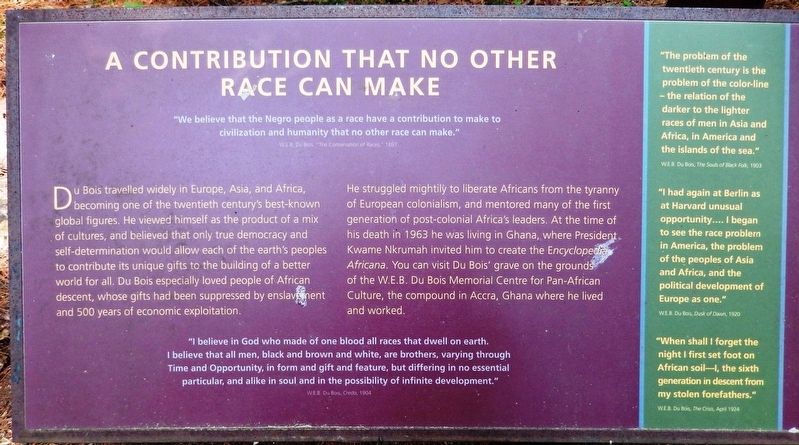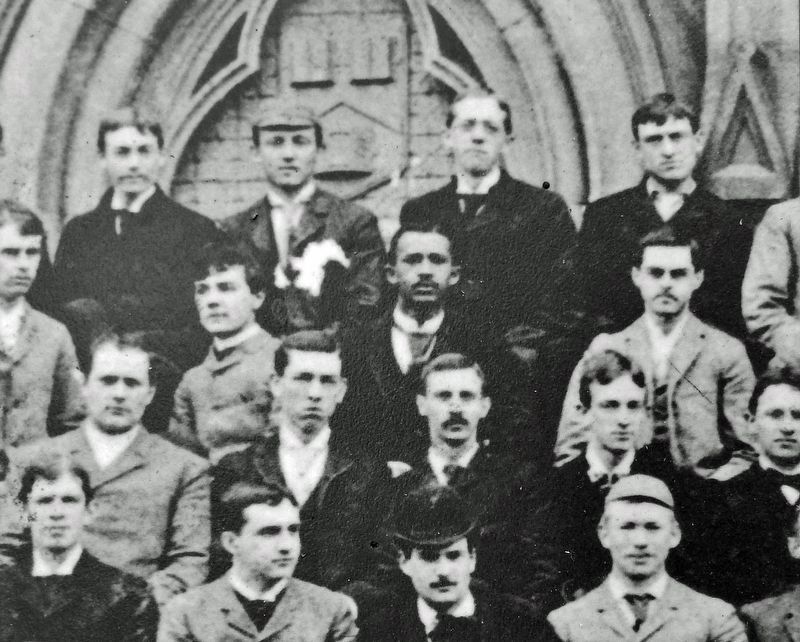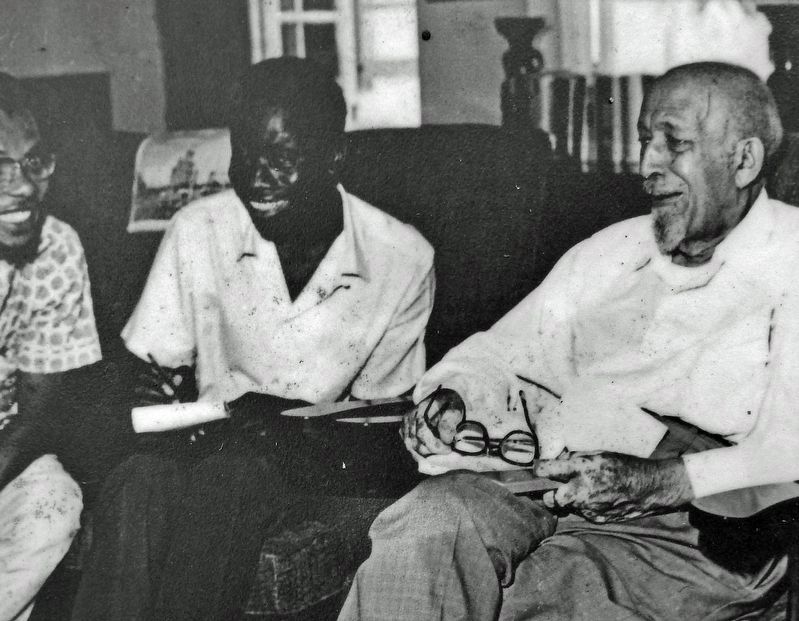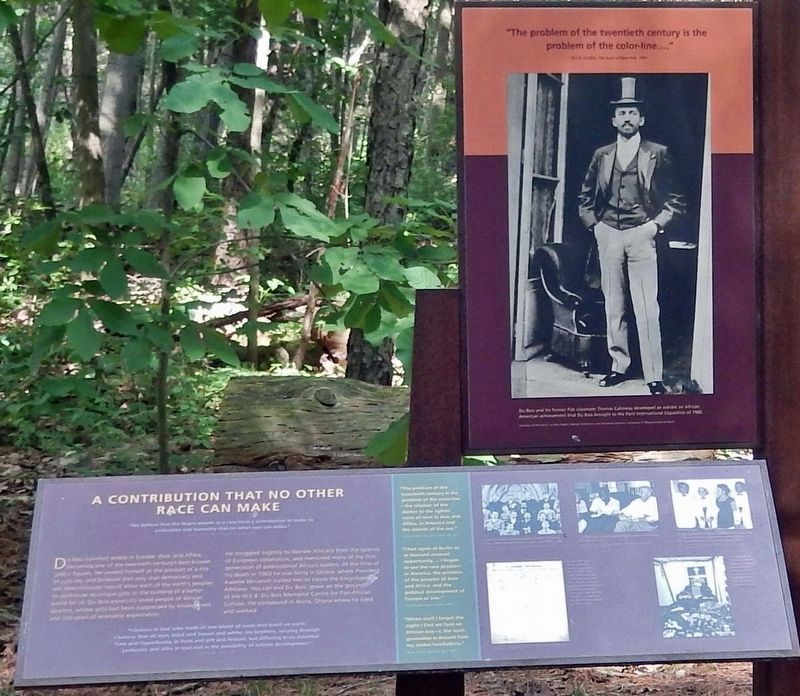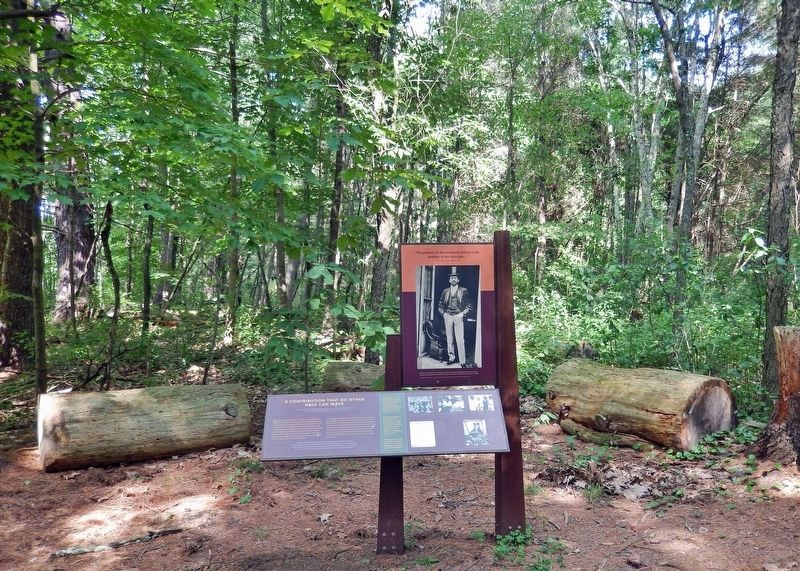Great Barrington in Berkshire County, Massachusetts — The American Northeast (New England)
A Contribution that No Other Race Can Make
W.E.B. Du Bois National Historic Site
”We believe that the Negro people as a race have a contribution to make to civilization and humanity that no other race can make.”
—W.E.B. Du Bois, “The Conservation of Races,” 1897
Du Bois travelled widely in Europe, Asia, and Africa, becoming one of the twentieth century's best-known global figures. He viewed himself as the product of a mix of cultures, and believed that only true democracy and self-determination would allow each of the earth's peoples to contribute its unique gifts to the building of a better world for all. Du Bois especially loved people of African descent, whose gifts had been suppressed by enslavement and 500 years of economic exploitation.
He struggled mightily to liberate Africans from the tyranny of European colonialism, and mentored many of the first generation of post-colonial Africa's leaders. At the time of his death in 1963 he was living in Ghana, where President Kwame Nkrumah invited him to create the Encyclopedia Africana. You can visit Du Bois' grave on the grounds of the W.E.B. Du Bois Memorial Centre for Pan-African Culture, the compound in Accra, Ghana where he lived and worked.
"I believe in God who made of one blood all races that dwell on earth. I believe that all men, black and brown and white, are brothers, varying through Time and Opportunity, in form and gift and feature, but differing in no essential particular, and alike in soul and in the possibility of infinite development."
—W.E.B. Du Bois, Credo, 1904
"The problem of the twentieth century is the problem of the color-line — the relation of the darker to the lighter races of men in Asia and Africa, in America and the islands of the sea."
—W.E.B. Du Bois, The Souls of Black Folk, 1903
"I had again at Berlin as at Harvard unusual opportunity.... I began to see the race problem in America, the problem of the peoples of Asia and Africa, and the political development of Europe as one."
—W.E.B. Du Bois, Dusk of Dawn, 1920
”When shall I forget the night I first set foot on African soil — I, the sixth generation in descent from my stolen forefathers.”
—W.E.B. Du Bois, The Crisis, April 1924
Topics. This historical marker is listed in these topic lists: African Americans • Cemeteries & Burial Sites • Civil Rights • Education.
Location. 42° 10.702′ N, 73° 23.661′ W. Marker is in Great Barrington, Massachusetts, in Berkshire County. Marker can be reached from South Egremont Road (Massachusetts Route 23/41) 0.1 miles south of Egremont Plain
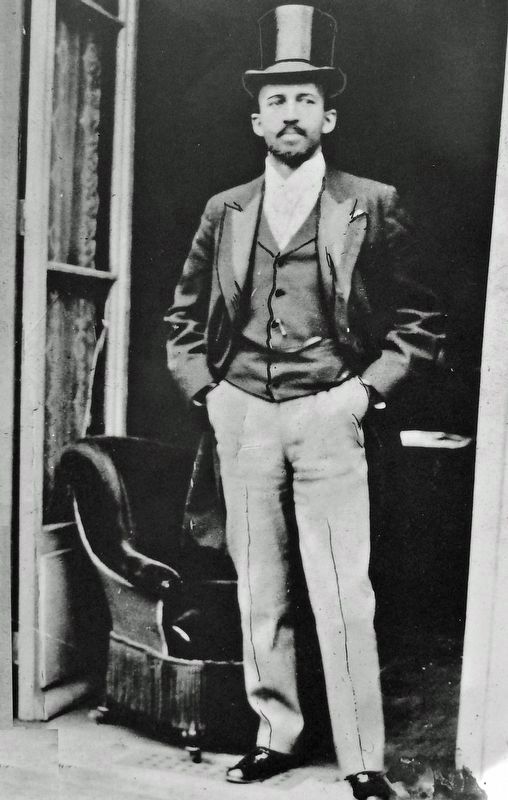
W.E.B. Du Bois Papers, Special Collections & University Archives, University of Mass. Amherst
2. Marker detail: W.E.B. Du Bois
Du Bois and his former Fisk classmate Thomas Calloway developed an exhibit on African American achievement that Du Bois brought to the Paris International Exposition of 1900.
Other nearby markers. At least 8 other markers are within walking distance of this marker. Boulder Dedicated to the Legacy of W.E.B. Du Bois (within shouting distance of this marker); A Tireless Explorer of Social Truths (within shouting distance of this marker); Grass Roots Democracy (within shouting distance of this marker); Democracy and Human Rights (within shouting distance of this marker); W.E.B. Du Bois: Architect of the Modern Civil Rights Movement (about 300 feet away, measured in a direct line); I Have A Sentimental Desire to Keep this Place (about 400 feet away); W.E.B. Du Bois Boyhood Homesite (about 400 feet away); The House of the Black Burghardts (about 400 feet away). Touch for a list and map of all markers in Great Barrington.
Related markers. Click here for a list of markers that are related to this marker. W.E.B. Du Bois National Historic Site
Also see . . . W.E.B. Du Bois.
Du Bois believed that his life acquired its only deep significance through its participation in what he called “the Negro problem,” or, later, “the race problem.” Whether that is true or not, it is difficult to think of anyone, at any time, who examined the race problem in its many aspects more profoundly, extensively, and subtly than W.E.B. Du Bois. Du Bois was an activist and a journalist, a historian and a sociologist, a novelist, a critic, and a philosopher — but it is the race problem that unifies his work in these many domains.(Submitted on April 2, 2022, by Cosmos Mariner of Cape Canaveral, Florida.)

W.E.B. Du Bois Papers, Special Collections & University Archives, University of Mass. Amherst
5. Marker detail: Du Bois & Ghana President Kwame Nkrumah
Du Bois took pride in President Kwame Nkrumah’s inauguration in 1961 as the democratically elected leader of Ghana, the first newly independent sub-Saharan African nation.
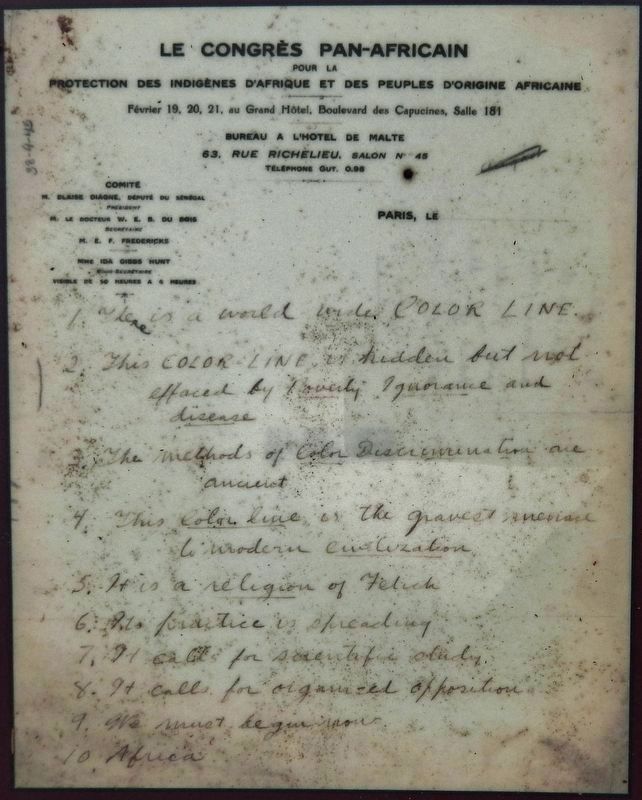
W.E.B. Du Bois Papers, Special Collections & University Archives, University of Mass. Amherst
6. Marker detail: Pan African Congress Notes
Du Bois helped to organize five Pan African Congresses, held in 1919, 1921, 1923, 1927, and 1945, where representatives from African countries demanded independence from their European colonizers. Here are the notes for his address to the Pan African Congress in Paris in 1919.
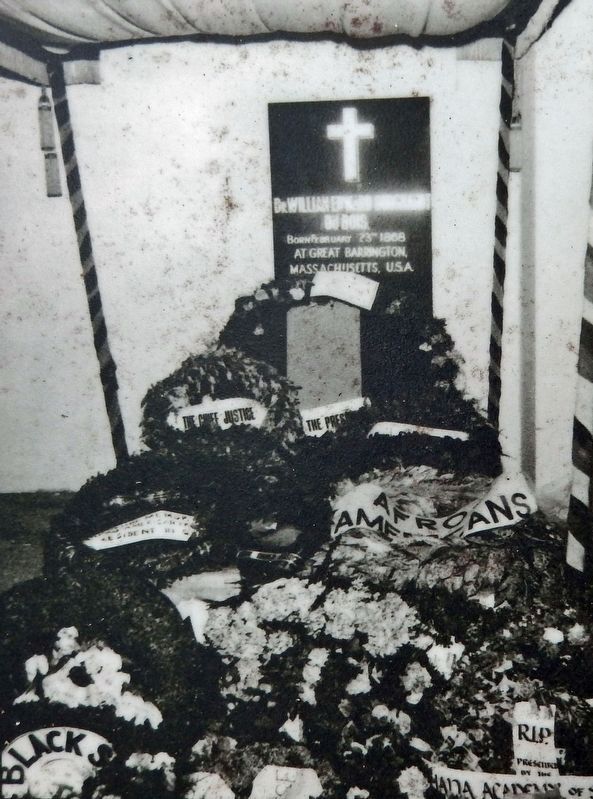
W.E.B. Du Bois Papers, Special Collections & University Archives, University of Mass. Amherst
7. Marker detail: W.E.B. Du Bois Funeral
At his funeral, an inscription amid the mountain of garlands and wreaths from around the world recalled his birth in Great Barrington, a tie that he held throughout his life.
Credits. This page was last revised on April 2, 2022. It was originally submitted on April 2, 2022, by Cosmos Mariner of Cape Canaveral, Florida. This page has been viewed 139 times since then and 15 times this year. Photos: 1, 2, 3, 4, 5, 6, 7, 8, 9. submitted on April 2, 2022, by Cosmos Mariner of Cape Canaveral, Florida.
